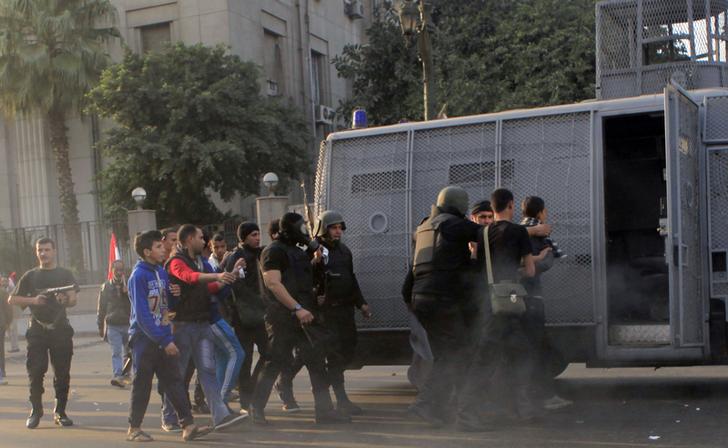Latest NEWS
- Aswat Masriya, the last word
- Roundup of Egypt's press headlines on March 15, 2017
- Roundup of Egypt's press headlines on March 14, 2017
- Former Egyptian President Hosni Mubarak to be released: lawyer
- Roundup of Egypt's press headlines on March 13, 2017
- Egypt's capital set to grow by half a million in 2017
- Egypt's wheat reserves to double with start of harvest -supply min
- Roundup of Egypt's press headlines on March 12, 2017
Sisi has overseen reversal in human rights gained after 2011 - HRW

Riot police arrest anti-government protesters during clashes at Ramsis street in downtown Cairo, January 25, 2014. REUTERS/Amr Abdallah Dalsh
CAIRO, Jan 29 (Aswat Masriya) – International watchdog Human Rights Watch (HRW) said the government of Egypt "consolidated control through constriction of basic freedoms and a stifling campaign of arrests," in a report on Wednesday.
The report states that Egypt's "human rights crisis, the most serious in the country’s modern history, continued unabated throughout 2014."
In an introduction to the annual report which details human rights conditions in more than 90 countries, HRW Executive Director Kenneth Roth described the "the brutal reign of the general-turned-president," in reference to President Abdel Fattah al-Sisi.
Sisi resigned from his position as defence minister and head of the armed forces in March 2014 ahead of launching his presidential bid.
The report states that Sisi has overseen a "reversal of the human rights gains" after the January 2011 uprising.
The passing of four years since the uprising was marked on Sunday and was marred with deadly violence, leaving at least 23 people dead, according to official figures.
HRW shut down its Cairo office in February 2014, citing "concerns about the deteriorating security and political environment in the country."
Roth said "the military coup led by Sisi devastated the [Muslim] Brotherhood and its supporters."
The report states several figures on arrests since the ouster of Islamist president Mohamed Mursi in July, 2013, citing different sources, all of which run in thousands.
The most conservative of the figures cites Egyptian security as saying that 22,000 were arrested within a year of Mursi's ouster.
Meanwhile, a local Egyptian NGO is cited as saying that within 11 months of the power shift, more than 40,000 were arrested. The Brotherhood, however, said that as many as 29,000 of its members are in prisons.
The report directed some criticism at the Egyptian judiciary, saying that judges routinely renewed detentions, "without charge or trial." It added that judges convicted others in "mass trials without establishing individual guilt for criminal offenses."
The report described the judiciary as having "exhibited serious procedural deficiencies that deprived detainees of basic due process rights."
It added that many trials violated both local laws and international standards.
Roth believes that the uprising in 2011 was followed by Egypt's "first free and fair presidential election," which brought Brotherhood candidate Mursi to power in June 2012.
The Islamist president was eventually ousted by the military in July 2013 following mass protests against him and presidential elections in 2014 brought Sisi to power instead.
Roth said Mursi's rule left many in Egypt with fears of "gradual emergence of a strict Islamic regime." But he added that the abuses of Mursi's government "never came close to those now being visited upon the Egyptian people by the military-dominated government that overthrew" Mursi.
He criticsied the international community's reaction to developments in Egypt, saying it has been "shamefully inadequate" and specifically addressed the roles played by the United States, the United Kingdom, France, Saudi Arabia and the United Arab Emirates.
"International support for the repressive Sisi government is not only a disaster for Egyptian hopes of a democratic future; it sends an appalling message to the region," Roth said.










